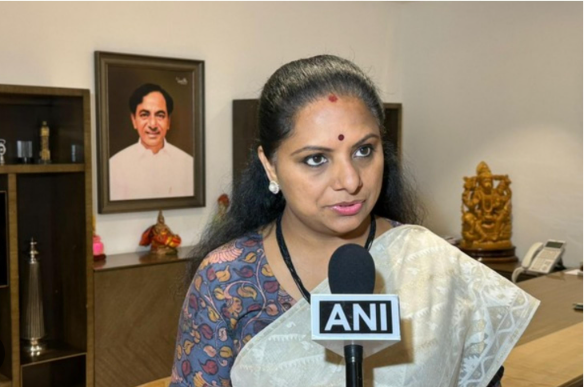The Supreme Court of India recently granted bail to K. Kavitha, a prominent leader of the Bharat Rashtra Samithi (BRS) and the daughter of Telangana Chief Minister K. Chandrasekhar Rao, in connection with the ongoing investigations into the alleged irregularities in the Delhi excise policy. The decision to grant bail in cases filed by both the Enforcement Directorate (ED) and the Central Bureau of Investigation (CBI) has garnered significant attention, given the high-profile nature of the case and its implications for Indian politics.
The Background of the Excise Policy Cases
The Delhi excise policy case revolves around allegations of corruption and financial irregularities in the formulation and implementation of the Delhi government’s liquor policy. The policy, which was introduced in 2021, aimed to reform the liquor distribution system in the national capital by introducing private players and increasing revenue for the state. However, the policy quickly became mired in controversy, with allegations that it was designed to benefit select private entities at the expense of public interest.
1. Allegations Against the Delhi Government
The policy was accused of violating established norms and procedures, leading to an undue advantage for certain private companies. Critics claimed that the policy was tailored to favor a cartel of liquor distributors and retailers, who allegedly paid kickbacks to government officials and politicians to secure favorable terms. The opposition parties, particularly the Bharatiya Janata Party (BJP), accused the ruling Aam Aadmi Party (AAP) of being involved in large-scale corruption.
2. Involvement of K. Kavitha
K. Kavitha’s name surfaced in the investigations when the ED and CBI began probing the alleged money trail connected to the excise policy. The agencies claimed that Kavitha played a key role in the conspiracy, acting as a conduit between the policy’s beneficiaries and the political establishment. It was alleged that she used her political influence to secure favorable outcomes for certain liquor businesses, leading to significant financial gains.
3. The Arrest and Legal Proceedings
In early 2023, both the ED and CBI took significant steps in their investigations, leading to the arrest of several individuals linked to the case, including Kavitha. The agencies charged her under various sections of the Prevention of Money Laundering Act (PMLA) and the Indian Penal Code (IPC) for her alleged involvement in the financial irregularities. Kavitha, however, denied all the charges, calling them politically motivated and a result of a vendetta against her family and party.
The Supreme Court’s Decision to Grant Bail
K. Kavitha’s bail plea was initially rejected by the lower courts, which cited the seriousness of the charges and the ongoing investigation as reasons for denying her release. However, Kavitha’s legal team approached the Supreme Court, arguing that the continued detention was unjustified and that she was being targeted due to her political affiliations.
1. Arguments Presented by Kavitha’s Legal Team
Kavitha’s defense argued that the evidence presented by the investigating agencies was circumstantial and insufficient to justify her continued incarceration. They contended that there was no direct evidence linking her to the alleged corruption and that her arrest was based on speculative assumptions rather than concrete proof. The defense also pointed out that Kavitha had cooperated fully with the investigation, appeared for questioning whenever summoned, and had no intention of fleeing or tampering with evidence.
2. Supreme Court’s Observations
The Supreme Court, after hearing the arguments from both sides, observed that while the charges against Kavitha were serious, the principle of “bail, not jail” should be upheld unless there were compelling reasons to deny her release. The court noted that Kavitha had already spent several months in custody and that the investigations were likely to continue for an extended period. Given these factors, the court ruled that she should be granted bail, subject to certain conditions, including the surrender of her passport and regular appearances before the investigating agencies. 
3. Conditions of Bail
The Supreme Court set specific conditions for Kavitha’s bail, including:
- A bail bond and surety amount as decided by the court.
- Surrendering her passport to prevent any attempt to leave the country.
- Regular appearances before the ED and CBI as required for further investigation.
- Refraining from influencing witnesses or tampering with evidence.
- The option for the investigating agencies to apply for cancellation of bail if Kavitha violated any of the conditions.
Political Ramifications of the Bail
The Supreme Court’s decision to grant bail to K. Kavitha has far-reaching political implications, both for the BRS and the broader political landscape in India. The case has not only drawn attention to the alleged corruption in the Delhi excise policy but has also highlighted the ongoing tussle between regional parties and the central government.
1. Impact on BRS and K. Chandrasekhar Rao
For the BRS and its leader, K. Chandrasekhar Rao, Kavitha’s bail provides a temporary respite from the intense political and legal scrutiny the party has faced in recent months. The party has consistently maintained that the case against Kavitha was part of a larger political conspiracy to undermine its leadership and influence in Telangana. With Kavitha out on bail, the BRS can now refocus its energies on upcoming state elections, where it will be crucial for the party to consolidate its position.
2. Regional Politics and the Opposition’s Strategy
The case against Kavitha has also had a significant impact on regional politics. The BRS, which has been positioning itself as a formidable regional force in Telangana, has accused the BJP-led central government of using investigative agencies to target its leaders. This has led to a rallying of support from other regional parties, which view the case as part of a broader strategy by the BJP to weaken opposition parties across the country. The bail decision could therefore strengthen alliances between regional parties and contribute to a more coordinated opposition strategy in the run-up to the general elections.
3. Implications for the Aam Aadmi Party (AAP)
While K. Kavitha’s involvement in the excise policy case has primarily affected the BRS, it has also had implications for the Aam Aadmi Party (AAP), which governs Delhi. The allegations of corruption in the excise policy have put the AAP on the defensive, with the party’s leadership facing accusations of collusion and financial misconduct. The bail granted to Kavitha may shift the focus back to the policy’s formulation and the role of AAP leaders, potentially leading to further investigations and political fallout. 
4. The BJP’s Narrative and Central Government’s Position
The BJP, which has been at the forefront of the campaign against the alleged corruption in the excise policy, may face challenges in sustaining its narrative following Kavitha’s release on bail. The party has consistently portrayed itself as a crusader against corruption and has used cases like these to discredit its political rivals. However, with the Supreme Court granting bail, the BJP may need to recalibrate its strategy and focus on ensuring that the investigations continue without appearing to be politically motivated.
The Broader Legal and Judicial Context
The decision to grant bail to K. Kavitha also raises important questions about the legal and judicial processes in high-profile cases involving political figures. The K. Kavitha case highlights the complexities of balancing the need for thorough investigations with the rights of the accused, especially when the accused are prominent political leaders.
1. The Principle of ‘Bail, Not Jail’
The Supreme Court’s decision underscores the principle of “bail, not jail,” which is a cornerstone of criminal justice in India. This principle holds that pre-trial detention should be an exception rather than the rule and that bail should be granted unless there are compelling reasons to deny it, such as the risk of flight, tampering with evidence, or committing further offenses. In Kavitha’s case, the court’s decision reflects a cautious approach, recognizing the seriousness of the charges while also upholding the accused’s right to liberty.
2. The Role of Investigative Agencies
The K. Kavitha case also brings to the fore the role of investigative agencies like the ED and CBI in politically sensitive cases. These agencies are often accused of being influenced by political considerations, particularly when their investigations involve opposition leaders. The perception of bias can undermine public trust in the legal process and lead to allegations of selective targeting. The outcome of the case against Kavitha will likely be scrutinized in this context, with both the agencies and the judiciary under pressure to demonstrate impartiality and adherence to the rule of law.
3. Judicial Oversight and Accountability
Judicial oversight is crucial in K. Kavitha cases where the executive branch is perceived to be overstepping its bounds. The judiciary’s role in granting bail and monitoring ongoing investigations is vital to ensuring that the rights of the accused are protected while allowing the legal process to unfold. The Supreme Court’s decision in Kavitha’s case reflects the importance of judicial checks and balances in a democratic system, particularly in cases with significant political ramifications.
Future Prospects and Challenges
The legal and political developments surrounding K. Kavitha’s case are likely to have a lasting impact on both the BRS and the broader political landscape in India. As the investigations continue, several challenges and questions remain, which will shape the future trajectory of the case and its implications.
1. Continuation of the Legal Battle
While K. Kavitha has been granted bail, the legal battle is far from over. The ED and CBI will continue their investigations, and the case will likely progress through the courts over the coming months. Kavitha’s legal team will need to prepare for the possibility of further charges or the discovery of new evidence that could affect the case’s outcome. The legal proceedings will also be closely watched by political observers, given their potential impact on the BRS and its leadership.
2. Impact on the 2024 General Elections
The timing of Kavitha’s bail and the ongoing investigations could have significant implications for the 2024 general elections. The BRS, along with other opposition parties, will likely use the case to rally support and criticize the BJP’s use of investigative agencies. Conversely, the BJP may continue to highlight the case as part of its broader anti-corruption narrative, seeking to discredit its opponents. The outcome of the elections could hinge, in part, on how effectively each side navigates the political fallout from the case.
3. Strengthening Legal and Institutional Frameworks
The case against K. Kavitha also underscores the need for strengthening legal and institutional frameworks to ensure that high-profile investigations are conducted fairly and transparently. Reforms that enhance the independence and accountability of investigative agencies could help address concerns about political interference and restore public confidence in the legal system. Additionally, greater transparency in the formulation and implementation of policies, such as the excise policy, could prevent similar controversies in the future.
Conclusion
The Supreme Court’s decision to grant bail to K. Kavitha in the excise policy cases marks a significant development in a case that has captivated both legal and political circles in India. While the bail provides temporary relief for K. Kavitha and the BRS, the case is far from resolved, with ongoing investigations and potential legal challenges ahead. The case highlights the complex interplay between law and politics in India, underscoring the importance of judicial oversight, the principle of “bail, not jail,” and the need for fair and impartial investigations. As the case continues to unfold, its implications will be felt across the political spectrum, influencing the strategies and narratives of the major political parties as they prepare for the 2024 general elections. ALSO READ:- Former Jharkhand CM Champai Soren to Join BJP on August 30: A Significant Political Shift in Jharkhand’s Landscape





